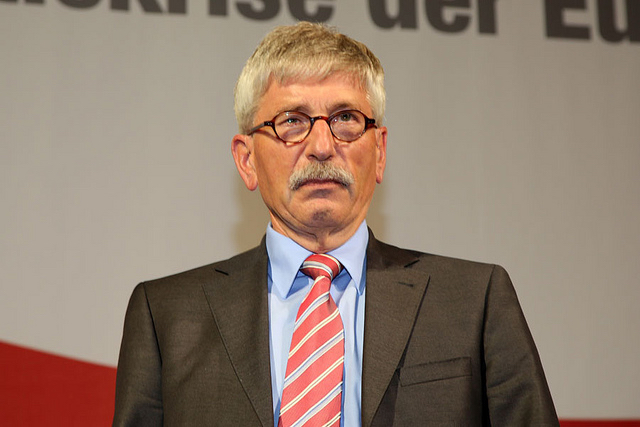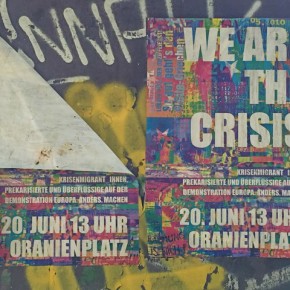Ambivalence towards reactionary thinking in Germany today – on the one hand, strongly rejected in official, polite discourse, while at the same time very popular – is best exemplified by the immense success of the writer and former Social Democrat, Thilo Sarrazin.
In his first book, Germany Abolishes Itself, which was published in 2010, Sarrazin formulated a modern, neoliberal Social Darwinist agenda, and once more made the old argument that higher birth rates among the lower classes, and particularly among non-German ethnic populations, would in the long run doom the homeland to decline. Sarrazin argued for more authoritarian treatment of migrant populations, and the underclass, more generally, and a reduction of the welfare state, which in his view contributed to the decadence of German society.
On top of that, he advocated for a program of positive eugenics: Encouraging well-educated people to have more children, while reducing the influx of “less intelligent” immigrants. As much as Sarrazin attempted to play the role of an unsentimental bourgeois who merely, in his humble way, attempted to speak common sense and point out some uncomfortable realities, his book was a calculated ideological provocation, a principled argument in favor of an authoritarian state and against the idea of human equality.
Unsurprisingly, Sarrazin’s book provoked an outcry. The country’s elite expelled Sarrazin from their midst, and he lost his position on the board of the German Central Bank. The Social Democratic Party (SPD), in which he had risen to the position of senator of finances in the Berlin city government, tried to expel him, but failed to overcome the legal hurdles. But, while, Sarrazin had quickly become toxic, and very few people declared themselves publicly in solidarity with him, his ideas proved extremely popular: Germany Abolishes Itself sold millions of copies, and was widely promoted in the media.
Sarrazin himself, in fact, became something of a TV personality. A poll found that 18% of all Germans would vote for a party based on his program. And when he argued in a 2012 book that Germany did not benefit from the euro, but was instead being exploited by the weaker European economies, he became one of the ideological founding fathers of the right-wing anti-Euro Alternative for Germany (AfD), which came into existence one year later.
As much as Sarrazin imagined himself as a brave dissident against left-wing hegemony, he was in many ways perfectly in tune with the zeitgeist. Beginning with the neoliberal reforms of the welfare state under Gerhard Schröder, an aggressive underclass discourse had emerged in Germany, which – following the Anglo-Saxon playbook – circled around themes of cultural and social dysfunction of particularly the “non-German”, mostly Muslim working classes, and of the unemployed, to justify a reduction in welfare spending.

In the American context, “social dysfunction” ever since the Moynihan report in the 1960s, refers to a lack of moral standards, that is, to drug use, sexual promiscuity, and out-of-wedlock births, etc., which are then taken to be the real root causes of poverty. In the German context, however, in an ironic reversal, the supposed traditionalism and patriarchal way of life of devout Muslims came to be identified with underclass dysfunction, and served as an explanation for the economic difficulties of many second generation immigrants. Neoliberal policies, aimed at disciplining the unemployed and subjecting them to stronger social control, coalesced with a growing distrust and fear of the Muslim population, during the era of the War on Terror.
If, under Merkel’s government, the country moved towards a more liberal vision of cultural diversity and tolerance, Germany never transcended the harsh disciplinary mood of its neoliberal economic model. In the German struggle to remain competitive on the world markets, both the supposedly socially dsyfunctional underclasses as well as the growing “foreign” population were by many increasingly perceived as dead weight: problematic populations that needed to be subjected to harsher discipline to prevent them from harming national competitiveness. As a consequence, life became much harder for both poor people and, more slowly, parts of the middle classes. Average real wages declined from 2000 to 2009 by 4.5%, and have stagnated ever since.
While the wealthy profited hugely from the export boom, among the more precarious parts of the middle class, a sense of malaise set in, which intensified their loss of trust in government, political elites, and the media, and which amplified the typical alienation from politics of our post-democratic societies. The rapid deregulation of the labor market particularly hit the middle classes in the economically much weaker East Germany, and eroded their sense of security and stability, which after all used to be the central promise of the European economic model.
As the middle class experienced stagnation, but was unable to grasp the idea that Germany’s economic growth must be benefitting somebody, if not themselves, it was easy to play on its feeling of being exploited by the undeserving poor – an ideological mechanism which on an international level worked very well during the euro crisis, and in the domestic context served to sanction growing wealth inequality.
Is it any wonder, then, that many people now have trouble seeing future citizens, workers, and potential contributors to the welfare system in the arriving refugees, when for many years in respectable neoliberal-conservative discourse “Muslim” was practically synonymous with “underclass,” which in turn was widely understood to signify “badly-educated”, “culturally alien” and “dysfunctional”?
And what about the Roma, for whom the same is true even more? Sarrazin spoke loud and clearly what many were only thinking: If we don’t control these people, if we don’t confront them with a strong hand, they will use our weakness and the softness of the welfare state to live at our expense. This sentiment, for so long without political expression, is now being radicalized.

In many ways, PEGIDA is similar to many anti-political movements that have cropped up all over the world in the wake of the financial crisis. Like the the 5-Star-movement in Italy, even Occupy Wall Street, it was a genuinely spontaneous grassroots movement, which at first had no connection to any established political forces or traditions, and no specific program.
In the beginning, PEGIDA was only a brand, a vague expression of discontent produced by political amateurs. Even though this ideological vacuum was quickly filled by more savvy people, in some way it still exists. PEGIDA does not see itself as struggling for a new, revolutionary order, as traditional neo-Nazis tend to do. Instead, it conceives of itself as a “resistance movement”. What they want is nothing than to preserve the status quo. But to preserve it, they argue, the state has to become much more authoritarian and ethnically homogeneous.
PEGIDA is not fighting for social change. It is fighting for more power, status and control for its members, and people like them: resentful, middle-class men. Other than that, the status quo is fine as it is.
These movements are therefore genuine in their rejection of National Socialist ideology, while nonetheless attempting to create a new, aggressive nationalism. Their leading ideologues, like the right-wing everywhere in Europe, have left behind much of the ballast of the old right, They stopped endlessly replaying imagined long-lost tank battles, gave up revanchist ideas in favor of a common European chauvinist identity, and have largely rethought their position on explicit anti-Semitism.
Taking their cue from groups like the Generation Identitaire in France, the Lega Nord or the punkish Casa Pound in Italy, and Hungary’s Jobbik party, they argue for a modern, European white nationalism. It is fascism for the age of European decline: Instead of dreaming of grand imperial wars, for which they lack both the revolutionary elan and the birth rate, they are obsessed with the sanctity of national sovereignty. Instead of global supremacy, they struggle for autonomous, isolated, and anti-modern societies, in which they would be once more totally in charge.
Photographs courtesy of VIPevents and Joel Schalit. Published under a Creative Commons license.





